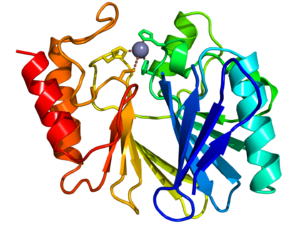 Image via WikipediaThe name "NDM-1" is spreading trough the news since today and it is called the new Superbug who could cause the next epidemic or even pandemic situation in our world (what a great time to start writing again about a possible endemic disease as soon as the WHO has declared the end of the swine flu pandemic today).
Image via WikipediaThe name "NDM-1" is spreading trough the news since today and it is called the new Superbug who could cause the next epidemic or even pandemic situation in our world (what a great time to start writing again about a possible endemic disease as soon as the WHO has declared the end of the swine flu pandemic today).NDM-1 which means New Delhi metallo-beta-lactamase 1 positive bacteria is a bacterial gene who gives at the moment the E. coli bacterias a drug resistance against common antibiotics. The most common diseases which result now from the contaminated NDM-1 gene are pneumonia and urinary tract infections.
Facts about NDM-1
- NDM-1 seems to be spreading from India and Pakistan to Europe, most of the time because of persons who made "cheaper" (cosmetic) surgeries or cancer treatments in these countries. It's another fact that in India antibiotic treatment is used for too many sicknesses even when it wouldn't be necessary (which would strongly influence bacterias to modify in such antibiotic-resistant ways)
- There are a few cases in other European countries (Sweden, Netherlands), the USA, Canada and Australia
- The superbug NDM-1 is already known for more than ONE YEAR. Last year in August 2009 there have been 22 known cases in the UK, now the newspapers report write there are 50 cases
- In comparison to the Swine flu scare from April 2008 - the H1N1-virus spread within weeks to almost all countries due to international travel and infected hundred thousands of persons but killed just a few thousand - it seems at the moment like "someone" wants to make panic because hundreds of newspaper write now about it.
- There are at the moment two known antibiotics which can fight against NDM-1 infected bacteria. The question is how long will these two antibiotics be successful as bacterias can modify their code quickly. In comparison developing new antibiotics takes up to 10 years.



Very interesting at the same frightening. I've worked in India and also hospitalize. I agree they really over use antibiotics there. I guess its now time to start antibiotics use control and find better alternatives.
ReplyDeleteNice update for the benefit of the people around the world.
ReplyDelete